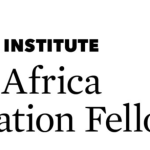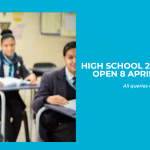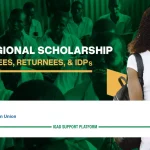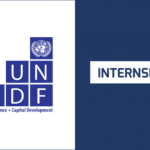Chatham House Richard & Susan Hayden Academy Fellowship 2023: Chatham House is pleased to invite applications for the Richard and Susan Hayden Academy Fellowship in the Queen Elizabeth II Academy for Leadership in International Affairs.
Application Deadline: 28th April 2023 at 10apm (GMT).
Eligible Countries: This fellowship is open to citizens of all countries.
To be taken at (country): The fellow will be based full-time at Chatham House, London. UK
About the Chatham House Richard & Susan Hayden Academy Fellowship: Chatham House, the Royal Institute of International Affairs, is a world-renowned independent policy institute. Based in London, our mission is to help build a sustainably secure, prosperous and just world. The Queen Elizabeth II Academy for Leadership in International Affairs was established in 2014 and opened by Her Late Majesty Queen Elizabeth II, adding the capacity to develop a new generation of leaders to the institute’s international reputation for informed debate and independent, cutting-edge research. The Academy aims to equip emerging leaders from around the world with the skills, knowledge, and networks to lead positive policy change in their areas of expertise. Through its programmes, the Academy seeks to provide opportunities for creative, curious, and intellectually driven individuals who share a commitment to tackling the most important challenges in the public sphere. It provides them with the opportunity and space to deepen their understanding of critical issues and to propose new ideas and solutions to complex policy challenges and opportunities.
This fellowship is a joint initiative with Richard and Susan Hayden. It offers candidates at the early-to-mid-stage of their career the opportunity to spend ten months at Chatham House working on an individual research project of their choosing.
To apply for our 2023-2024 Fellowships, we ask that you propose a research project that aims to contribute to Chatham House’s work, research priorities, and mission. Fellows are strongly encouraged to consider our existing research programmes and to develop research proposals that seek to directly contribute to our work on specific topics and regions. Below you can see some suggested topic areas for research projects. You should take into consideration how you can contribute to these priority research areas when designing your project proposal.
Global Economy and Finance Programme
- Are the existing international institutions for managing the global economy fit for purpose in responding to today’s pressing global challenges, such as climate change, health risks, rapid technological change and growing income and wealth inequality? If not, how can they be improved?
- Given the repercussions from Russia’s full-scale invasion of Ukraine and in the face of growing tensions between the US and China, economic security has become an increasingly important feature of national security. What broad strategies on economic security do different countries pursue and what are the key approaches being used in areas such as investment screening, export controls, resisting economic coercion and strengthening supply chain resilience? What role do unilateral measures vs international cooperation play? How can protection of national security in the economic field be balanced with maintaining as far as possible the benefits of an open economy?
US and the Americas Programme
- How can the US best leverage regional and multilateral institutions to advance its national security goals?
- How will the war in Ukraine affect the transatlantic partnership, and especially the US role in Europe?
- What will the impact be of polarisation in the US on US foreign policy?
- How is the rise of China impacting US policy and strategy in the Indo-Pacific? With respect to India?
- Have China’s diplomatic and economic approach differed in Africa and Latin America—both across both regions and within the region by country? What are the implications of any differences or similarities? How have host governments responded?
- How will US domestic challenges impact US foreign policy? How will a value-based US foreign policy evolve in the context of a global democratic decline?
Digital Society Initiative
- In recent months, the latest developments in the AI sphere, especially large language models, have attracted much media and public attention. Unfortunately, instead of generating an inclusive and evidence-based public debate, this increased interest has mainly led to over-hyped narratives on AI technologies, often alarmist in nature and in most cases misleading. What are the societal implications of generative AI? Which applications and challenges would benefit from public policy/governance discussions? What are some of the most promising (private and public) initiatives for the deployment of responsible and right preserving AI? How could the community foster greater collaboration and cross-fertilization among stakeholders across all fields in the AI space?
- In this roadmap for digital cooperation, the UN Secretary general highlighted the need to encourage and invest in the creation of digital public goods. What constitutes a Digital Public Good? What are the practical barriers to such goods and how could they be overcome? Which coalition of actors is needed to support the creation of such goods?
Contract type: Engagement in fellowship activities is a full-time time commitment throughout the 10 month duration (between October 2023 and July 2024).
A fellow’s time will be split between three key areas:
- Completing a personal research project: the fellow will choose and design an individual project to undertake with the guidance of a Chatham House expert (approximately 60%).
- Contributing to the ongoing research activities: working with their host research team and other Chatham House teams as appropriate (approximately 20%).
- Leadership Programme: A core part of Academy Fellowships, the Leadership Programme aims to develop the knowledge, network and self-awareness of fellows, and to equip them with important skills on which they can draw in their future careers as leaders in their field (approximately 20%).
Type: Fellowship (Academic, Career)
Eligibility:
- The Chatham House Richard & Susan Hayden Academy Fellowship is open to all nationalities.
- It is required that the applicant holds a completed BA degree or equivalent, Masters degree with an international focus is preferred.
- The fellowship is aimed at candidates at the mid-stage of their career and who come from academia, NGOs, business, government departments, civil society or the media. They should possess knowledge of, and an interest in, the policy challenges related to global governance laid out on the Fellowships page.
Selection Criteria: The best candidates typically possess many or all of the following characteristics:
- Clear evidence of their leadership experience and background (personal or professional).
- Ability to explore problems with a holistic and inclusive perspective, with a natural curiosity towards issues and areas in the broader environment around their more specific research area of expertise.
- An original, relevant and clear research project proposal – feasible in the given timeline of the fellowship.
- Relevant background experience, demonstrated through their curriculum vitae.
- Strong track record in their area of expertise, including delivering research
- Good writing and presentation skills and a publishing record.
- Awareness of the international context of their research.
- A post-fellowship plan indicating how the candidate will apply their skills, knowledge and experience to impact and influence in their home country or region.
- A clear vision of their contribution to the Academy programme and fellowship cohort.
Applicants must adhere to stated word limits and are advised to read through the information on the Academy’s webpages before applying. Late or incomplete applications will not be considered, nor will any additional or supplementary materials.
Number of Awardees: Not specified
Value of Chatham House Richard & Susan Hayden Academy Fellowship: The fellow will receive a monthly stipend to cover the costs of accommodation and subsistence. Additionally, the Academy will cover costs related to relocation, visas and payment of the UK’s Immigration Healthcare Surcharge which allows access to the UK National Health Service (Note: you may be required to pay for dental and optical treatments and medicines prescribed by a doctor), fieldwork and travel, research activities, and possible publication costs.
Duration of Fellowship: The fellowship is for a 10-month term.
How to Apply: Apply for this job
- GOODLUCK!
Visit Fellowship Webpage for details
Hi! AfterSchoolAfrica believes in sharing value. If you have come across this opportunity, share with ONLY one person Today.









